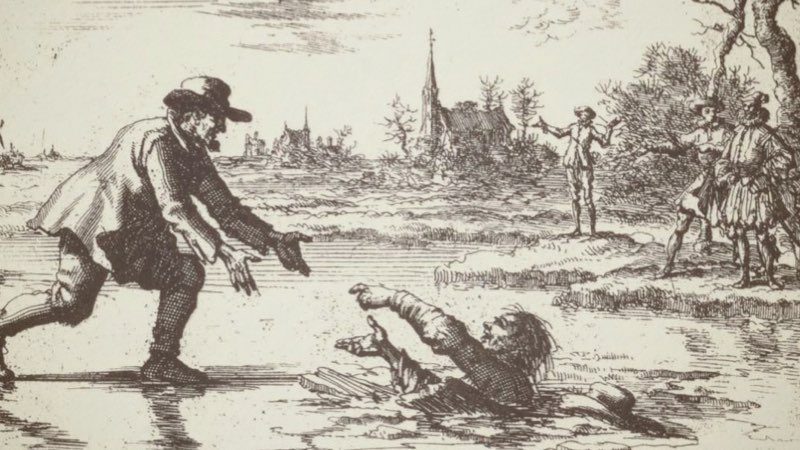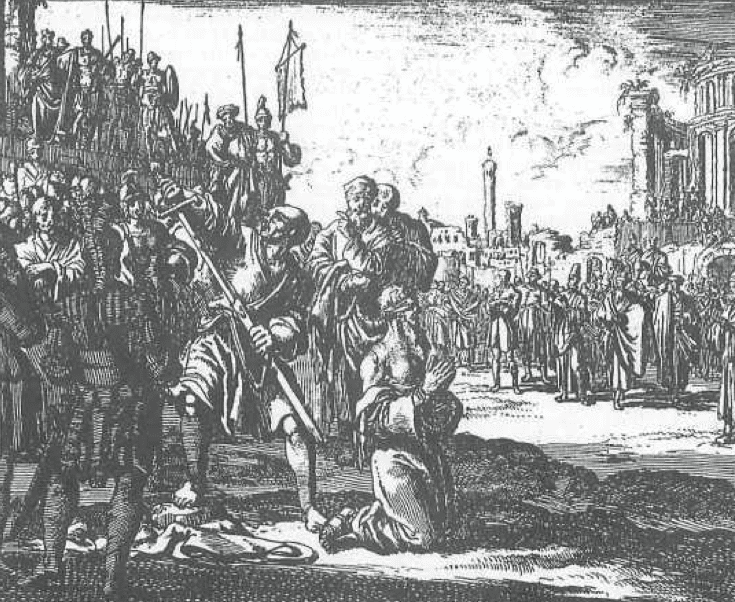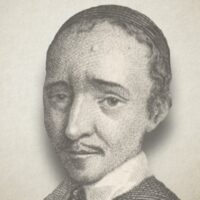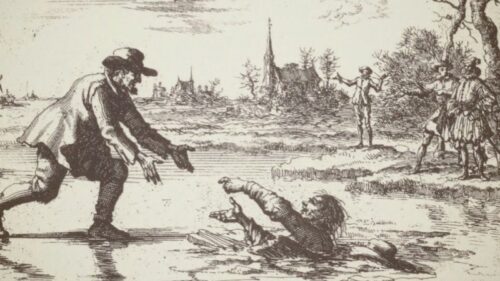
31. The Apostle Paul
The Apostle Paul Beheaded in Rome on Nero’s Orders, A.D. 69
Paul, the Apostle of Christ, Sorely Persecuted, and Finally Beheaded, at Rome, Under the Emperor Nero, A.D. 69
Saul, afterwards called Paul, was of Jewish descent, a Hebrew of the tribe of Benjamin; but, as to who his father and mother were, we find in Holy Writ no record. Phil. 3:5.
As regards the place of his birth, it appears that his parents, either on account of persecution, or of the Roman war, or for some other reason, left their place of residence in the portion of Benjamin, and went to dwell in a Roman, free city in Cilicia, called Tarsus, where Paul was born, who, although he was a Jew, yet, by the privileges of this city, became a Roman citizen. Acts 22:3.
Respecting his early training, he was diligently instructed by the wise Gamaliel, in the law of the fathers; in which he became so proficient, that there were but few things in the entire Old Testament, with which he was not acquainted. Gal. 1:14.
He lived blamelessly, according to the law of Moses and the holy prophets, and that in the strictest order of Judaism; but, having not yet been rightly instructed in the doctrine of the holy Gospel, he, although in accordance with the law, manifested a wrong zeal, and persecuted the church of Christ; yea, at the death of Stephen he kept the garments of them that slew him. Acts 7:58.
But afterwards, having obtained letters from the priests at Jerusalem to the synagogues of Damascus, to bring as prisoners such men and women who confessed the name of Christ, the Lord, from heaven, arrested him in his course, calling, “Saul, Saul, why persecutest thou me? And he said, Who art thou, Lord? And the Lord said, I am Jesus whom thou persecutest: it is hard for thee to kick against the pricks. And he trembling and astonished said, Lord, what wilt thou have me to do? And the Lord said unto him, Arise, and go into the city, and it shall be told thee what thou must do” (Acts 9:1-6).
The men who journeyed with him stood speechless, hearing a voice, but seeing no man. Then he arose from the earth, to which he had been prostrated by fear; and when he opened his eyes, he could not see, so that they led him by the hand, and brought him into Damascus. Verses 7, 8.
In the city of Damascus there was a disciple, named Ananias; and to him the Lord said in a vision, “Arise, and go into the street which is called Straight, and inquire in the house of Judas for one called Saul, of Tarsus: for, behold, he prayeth.”
Ananias answered, “Lord, I have heard by many of this man, how much evil he hath done to thy saints at Jerusalem.”
Then said the Lord to him, “Go thy way: for he is a chosen vessel unto me, to bear my name before the Gentiles, and kings, and the children of Israel: for I will shew him how great things he must suffer for my name’s sake.
“And Ananias went his way, and entered into the house; and putting his hands on him, said, Brother Saul, the Lord hath sent me, that thou mightest receive thy sight, and be filled with the Holy Ghost. And immediately there fell from his eyes as it had been scales; and he received sight forthwith, and arose, and was baptized” (Acts 9: 7-16).
Such was the conversion of Saul, who was afterwards called Paul, and was one of the chief apostles of our Lord Jesus Christ: yea, he labored more abundantly than they all. I Cor. 15:10.
Immediately after his conversion, he preached Christ in the synagogues, that He was the Son of God. Acts 9:20.
Some time afterwards, the Holy Ghost said to the prophets and teachers at Antioch, after they had ministered to the Lord with fasting and prayer, “Separate me Barnabas and Saul for the work whereunto I have called them.” And thus they were sent out by the Holy Ghost. Acts 13:2,3.
In the meantime, Paul, formerly called Saul, was endowed with special gifts of the Holy Ghost, so that he had the spirit of discernment, prophecy, tongues, miracles. Acts 13:9,10; I Tim. 4:1; I Cor. 14:18; Acts 19:11.
He had also special revelations, so that, at a certain time, he was caught up to the third heaven, yea, into the heavenly paradise, where he heard unspeakable words, which no man can utter. 2 Cor. 12:1.
He was, moreover, adorned with many Christian virtues, which he practiced with a good conscience; as well as with faithfulness in his ministry, paternal care over all the churches, and sincere love for them, even unto death, so that he said, “Being affectionately desirous of you, we were willing to have imparted unto you, not the Gospel of God only, but also our own souls, be- cause ye were dear unto us” (I Thcss. 2:8).
He was free from covetousness, of a benevolent disposition, and would rather labor with his own hands, than be a burden to the church, lest it might prove a hindrance to the holy Gospel. Acts 20:34.
He vigorously withstood, and overcame through the Word of God, the erring spirits, sorcerers, Epicurean philosophers, and false prophets.
He feared neither great nor small, noble nor ignoble, Jew nor Greek; but taught the Word of God in sincerity.
What he suffered in seven great land and sea journeys, during the time of thirty years, during which he traveled in Judea, Syria, Asia, Macedonia, Greece, Italy, Spain, France, Germany, yea, almost through the whole then known world, is sufficiently evident, from Holy Scripture as well as from history.
It is computed, that until his first imprisonment at Rome, he had traveled over three thousand German miles, by water and by land, only for the Gospel’s sake; besides all the other arduous journeys he undertook, in order to strengthen, awaken, and comfort the newly-planted churches; in which he met with much vexation, misery and grief from the hands of the unbelievers. The words which the Lord had spoken at the time of his conversion, were fulfilled in every part: “I will shew him how great things he must suffer for my name’s sake” (Acts 9:16).
Shortly after he was baptized, and his zeal for the truth of Christ began to break forth at Damascus, proving to the Jews that Christ was come, they took counsel to kill him; wherefore he was let down by the wall in a basket, that he might escape their hands. Acts 9:24,25.
Afterwards, when he came to Iconium with his companion Barnabas, the Jews stirred up the Gentiles against him and his friend, intending to stone them. Acts 14:2,5.
But when they had fled to Lystra, and had made a cripple able to walk, there came certain Jews from Antioch and Iconium, and stirred up the people, so that they stoned Paul, whom they first had worshiped as a god, and drew him out of the city, supposing that he was dead: howbeit, as the disciples stood round about him, he rose up again. Acts 14:19,20.
Afterwards, traveling with Silas, and having, at Philippi, delivered a damsel from a spirit of divination, he and Silas were accused on that account, beaten with rods, cast into prison, their feet made fast in the stocks, and were kept in close confinement. But in the night God sent an earthquake, so that the foundations of the prison were shaken, the doors opened, and the bands (of the stocks) loosed of their own accord. By this means Paul and Silas were delivered, with the knowledge of the keeper, who accepted the faith, and was baptized. Acts 16:22-36.
Subsequently, being at Thessalonica, and having preached the Word of God three Sabbaths, so that of the devout Greeks, a great multitude believed, and of the chief women not a few, the Jews, who believed not, were moved with envy; wherefore they took unto them certain lewd fellows—market loungers—and gathered a great company, and set the city in an uproar, and assaulted the house of one Jason, thinking that Paul and Silas were within, and sought to bring them out to the people. And when they found them not, they drew Jason and certain brethren unto the rulers of the city, crying, “These that have turned the world upside down are come hither also; whom Jason hath secretly received” (Acts 17:1-7). From there, on account of the persecution, the brethren sent both of them away by night unto Berea. Verse 10.
After that, “when Gallio was the deputy of Achaia, the Jews made insurrection with one accord against Paul, and brought him to the judgment scat, saying, This fellow persuadeth men to worship God contrary to the law.” And when Paul was now about to open his mouth, to defend himself, Gallio said unto the Jews, to show to them the groundlessness of their accusations, “If it were a matter of wrong or wicked lewdness, O ye Jews, reason would that I should bear with you: but if it be a question of words and names, and of your law, look ye to it: for I will be no judge of such matters. And he drave them from the judgment seat.” Acts 18:12-16.
After this, there came down from Judea a prophet, named Agabus, who took Paul’s girdle, and bound himself saying, “Thus saith the Holy Ghost, So shall the Jews at Jerusalem bind the man that owneth this girdle, and shall deliver him into the hands of the Gentiles.” Thereupon the brethren besought Paul, not to go up to Jerusalem. But he answered, “What mean ye to weep and to break mine heart? for I am ready not to be bound only, but also to die at Jerusalem for the name of the Lord Jesus.” Acts 21:10-13. Oh, the great resolution of the Apostle Paul!
After that, when he, standing on the stairs at Jerusalem, defended himself before those who had accused him, it came to pass that the Jews, having given him audience for awhile, cast off their clothes, threw dust into the air, and cried, “Away with such a fellow from the earth: for it is not fit that he should live.” Acts 22:22, 23.
In the meantime he was bound, in order to be scourged; which he would not have escaped, had he not declared that he was a Roman citizen. Verses 25-29.
“Paul, earnestly beholding the council, said, Men and brethren, I have lived in all good conscience before God until this day. And the high priest Ananias commanded them that stood by him to smite him on the mouth” (Acts 23:1,2).
‘The night following, the Lord stood by him, and said, Be of good cheer, Paul: for as thou hast testified of me in Jerusalem, so must thou bear witness also at Rome” (verse 11).
And when it was day, certain of the Jews banded together, and bound themselves neither to eat nor to drink till they had killed Paul. And they were more than forty which had made this conspiracy. Verse 12.
But Paul was warned of this ambuscade by his sister’s son, and when the latter made it known to the chief captain of the Romans, measures were taken to escape it; wherefore he was brought in the third hour of the night to Caesarea, unto Felix the governor. Verses 16-33. And Felix kept him in Herod’s judgment hall, till his accusers should come. Verse 35.
After five days Ananias the high priest descended with the elders, and with the orator Tertullus, who informed the governor against Paul. And when Paul was called forth, Tertullus, after having saluted Felix with many flattering words, began to accuse him, saying, “We have found this man a pestilent fellow, and a mover of sedition among all the Jews throughout the world, and a ringleader of the sect of the Nazarenes: who also hath gone about to profane the temple: whom we took, and would have judged according to our law. But the chief captain Lysias came upon us, and with great violence took him away out of our hands,” etc. “And the Jews also assented, saying that these things were so.” Acts 24:1-9.
But that this was not so (although they sought to bring about his death by these accusations), is evident from the preceding facts mentioned in the Acts of the Apostles, and from the following defense of Paul, verses 10-21.
“But after two years Fortius Festus came into Felix’ room: and Felix, willing to shew the Jew a pleasure, left Paul bound” (verse 27).
Now when Festus was come into the province, after three days he ascended from Caesarea to Jerusalem. Then the high priest and the chief of the Jews went to him, and desired favor, that he would send for Paul to Jerusalem; laying wait in the way to kill him. Festus replied to the Jews, that Paul should be kept at Caesarea, and that those who were to accuse him, might come thither. Acts 25:4,5.
And when they were come, they brought forward many and grievous complaints, which they could not prove, and which Paul briefly and conclusively refuted, declaring that he had offended neither against the law of the Jews, nor against the temple, nor against Caesar. But being deceitfully asked by Festus, whether he was willing to go up to Jerusalem, to be judged there (where his mortal enemies were), he fearlessly replied, “I stand at Caesar’s judgment seat, where I ought to be judged: to the Jews have I done no wrong, as thou very well knowest. But if I be an offender, or have committed anything worthy of death, I refuse not to die.” Acts 25:9-11.
After this, Paul was examined by King Agrippa, in the presence of Festus. His defense caused Festus, who was a friend of the Jews, to exclaim: Paul, thou art beside thyself. Agrippa, however, declared that he was almost persuaded to become a Christian. He also gave as his opinion, that there was nothing worthy of death in him; wherefore he said to Festus, This man might have been set at liberty, if he had not appealed unto Caesar. Acts 26:1-32.
In the meantime it was determined that he should sail to Italy, to be examined before Caesar. To this end he and certain other prisoners were delivered to Julius, a centurion of the imperial band. Having embarked in a ship of Adramyttium, they sailed along Cyprus, Cilicia, Pamphylia, and other countries, to Myra in Lycia, where they were transferred into a ship of Alexandria bound for Italy. In this ship they sailed against Cnidus, as far as under Crete, over against the city of Salmone; thence to a place which is called the Fair Havens, nigh to Lasea. Acts 27:1-8.
At this place Paul foretold them, that they would not complete this voyage without great damage, danger of shipwreck, and peril of life; but the centurion believed the master and the owner of the ship, more than those things which were spoken by Paul. Verses 10,11.
Departing thence, they hoped to winter at Phenice, a haven of Crete; but they touched at Asson, and sailed close by Crete. Verses 12,13.
Then the ship was caught by a northeast wind, which had sprung up, and carried her, against their purpose, through the billows so that they had to let her drive before it; however, they came to the Island Clauda, yet with fear, lest they should fall into the quicksands. Verses 16,17. For many days and nights they saw neither sun nor stars through the mighty tempest, so that all hope that they should be saved was taken away. Verse 20.
Meanwhile God sent His angel on a certain night to Paul, saying, “Fear not: thou must be brought before Caesar: and, lo, God hath given thee all them that sail with thee.” Verses 23,24.
Thereupon Paul urged them to take meat, for the preservation of their lives, for, on account of their deadly fear, they had not eaten anything for fourteen days; and breaking the bread, for to eat, he gave thanks to God in the presence of them all. Verses 33-36.
And when it was day, they knew not the land: but they discovered a creek; which however they could not enter, but ran aground, before the island of Melita (now called Malta); where the forepart of the ship stuck fast, but the hinder part was broken in pieces by the waves. Verses 39-41. Here the soldiers held a council and decided to kill the prisoners, including Paul, lest any of them should swim out, and escape. The centurion, however, willing to save Paul, kept them from then- purpose: and commanded that they who could swim should cast themselves first into the sea, and get to land which was done; and the rest floated, some on boards, and some on broken pieces of the ship, so that all, namely, one hundred and seventy souls, escaped to land. Verses 42-44. Thus was fulfilled what Paul had foretold them, namely, that they should suffer shipwreck, and yet escape with their lives.
Here Paul was first pronounced a murderer, but afterwards a god, by the inhabitants of the island; and this, because they observed a viper fastening itself on his hand, which he shook off into the fire, without suffering any harm. Acts 21:3-6.
After three months they sailed for Italy in a ship which had wintered in the isle: yet they arrived first at Syracuse, in Sicily, and then at Puteoli, on the Italian border, where Paul found brethren, with whom he tarried seven days; others came to meet him as far as Appii Forum, and the Three Taverns. Proceeding, he came to Rome, where the centurion delivered him to the chief captain, to be brought before Csesar. In the meantime he was kept by a soldier, and bound with a chain. Verses 11-16, 20.
We have narrated all these things the more circumstantially (and this, according to Holy Scripture) in order that it may be seen, how much this pious man suffered in his travels by sea and by land, for the sake of the holy Gospel. Of all this he gives a brief account in his second epistle to the Corinthian church, writing thus: “Of the Jews five times received I forty stripes save one. Thrice was I beaten with rods, once was I stoned, thrice I suffered shipwreck, a night and a day I have been in the deep; in journeyings often, in perils of waters, in perils of robbers, in perils by mine own countrymen, in perils by the heathen, in perils in the city, in perils in the wilderness, in perils among false brethren; in weariness and painfulness, in watchings often, in cold and nakedness” (2 Cor. 11:24-27).
Yea, it appears from the first epistle to the Corinthians, that he was thrown before the wild beasts in a theater at Ephesus, to be torn to pieces, or at least, to fight for his life with them; from which God at that time delivered him. Concerning this, the intelligent may judge; he writes, “If after the manner of men I have fought with beasts at Ephesus, what advantageth it me, if the dead rise not?” (I Cor. 15:32).
As regards his imprisonment at Rome, most of the ancient writers are of the opinion that, although nearly all his friends forsook him at the time when he was to make his defense, he, being brought before Caesar, defended himself so cleverly against the accusation of the Jews, that he was set free for this time. But how true this is, we leave to its own merits, and to the omniscient God. This much, however, is certain, that while in prison at Rome, he wrote to his spiritual son Timothy, that he was now ready to be offered as a drink offering, and that the time of his departure was at hand; but that he took comfort in the thought, that he had fought a good fight, finished his course, and kept the faith, and that there was laid up for him a crown of righteousness, which the Lord, the righteous Judge, should give him at that day. 2 Tim. 4:6-8.
According to ancient records he was then beheaded at the command of Nero, outside of Rome, on the road that leads to Ostia, called Via Ostiensis, where the Romans used to have their place of exe- cution, in the last year of Nero, or about A.D. 69. Joh. Gys. in the History of the Martyrs, from Joseph Scaliger, about Paul. Egesipp. Hist. De- struc. Jerusal., lib. 3, cap. 2. Konst-tooneel van veerting heerlijke afbeeldingen Christs en sijner Apostclen, printed Anno 1609; about the life of Paul. Itinerarium Sacrce, Scriptures per H. Bunt- ing, translated into the Dutch by Matthias Hazard; printed Anno 1624. in the Travels of Paul, page 162. col. 1.
Thieleman J. Van Braght (1625-1664) was an Anabaptist who is best known for writing a history of the Christian witness throughout the centuries entitled “The Bloody Theater or Martyrs Mirror of the Defenseless Christians who baptized only upon confession of faith, and who suffered and died for the testimony of Jesus, their Saviour, from the time of Christ to the year A.D. 1660” (1660).
Thieleman J. Van Braght, Martyrs Mirror





